Background
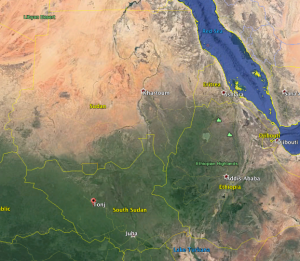 Tonj is a village in South Sudan, which separated from Sudan under a peace treaty in 2005.
Tonj is a village in South Sudan, which separated from Sudan under a peace treaty in 2005.
Sudan was one of many African nations welded together after the end of Belgian, French and British colonial rule. The north was mainly Islamist and Arabic, while the south maintained a strong Christian tradition once initiated by French missionaries.
During the 1990’s, civil war raged between the north and south. The government forces of Khartoum bombed and burned villages in the south, and enslaved children as soldiers. Famine ravished the south.
Our Mission
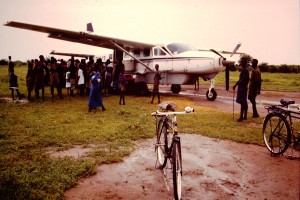
I went to Tonj in August, 1998 with a group of Evangelical Christian missionaries from Calvary Chapel, Rancho Santa Margarita. We flew from Nairobi through Lokachokio on the Kenya – Sudanese border to a dirt airstrip 200 miles into southern Sudan.
The Sudanese Peoples Liberation Army, or SPLA, controlled southern Sudan. We entered the country illegally. Our leaders warned that if we were caught we would likely be killed. During the August rainy season, northern transport vehicles could not use the roads to approach the village, but in the past they had raided on horseback. Although our leaders provided rudimentary survival gear, no one really had a clue how to survive, let alone find our way home in the event that we evaded capture.
Someone gave us a talk about snakes we needed to avoid because there was no anti-venom: the cobra, black mamba and green mamba. If you got bit by a cobra, you would feel fine at first, then you would go sit under a tree, go to sleep and die. They referred to the black mamba as the two twitch snake because if you got bit you would twitch twice before falling over dead. The green mamba was the one twitch snake. They liked to hang out on tree branches and fall on their victims.
Another leader issued each of us a Taser, with instructions on how we might treat cobra bites by shocking the wound. (Years later, a biologist told me the truth. Tasers can’t treat snake bites.)
Several missionary groups were rotating in and out of Tonj. The village had swollen to several thousand because starving people were walking from far away to find food. They would walk many days; the people did not use numbers to describe time or distance, so I won’t try either. No one wore shoes.
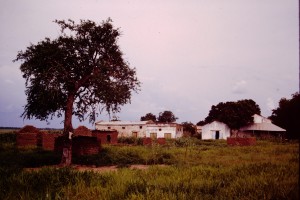
French missionaries had constructed most of the buildings in Tonj, including the Catholic church. The priest had recently died of starvation because he gave away all his food. Nuns ran church services. I remember hearing beautiful singing in church Sunday morning. We didn’t attend church because the evangelicals didn’t think the Catholics had been saved.
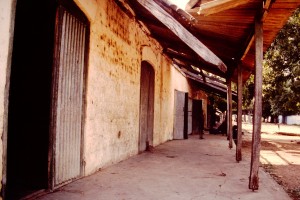
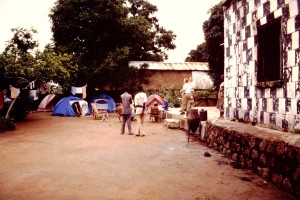
Most villagers lived in concrete and stone barracks. Many buildings had been bombed, burned and abandoned. We stayed in a walled compound that included a building that might have been an old warehouse. At night our compound was guarded by SPLA soldiers carrying AK-47’s. They may have been fifteen years old.
About a third of the people were malnourished or starving. Ribs of adults protruded through emaciated chests. Children suffered from aprotein deficiency called Kwashiorkor.
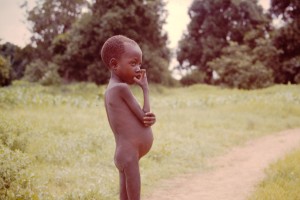
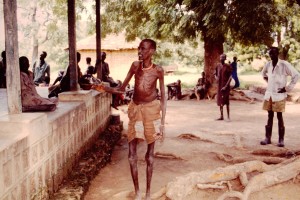
My personal challenges in Tonj were basic: sleeping, eating, shitting and peeing.
Sleeping: I managed to sleep maybe an hour or two each night.
Eating: I hardly ate a thing while I was in Tonj. Our group had plenty of food, but I didn’t want to eat while people around me were starving. Each day I would eat a handful of peanuts and drink coffee and Gatorade.
Shitting: I was constipated the entire time I was there. I didn’t want to shit. The shitter was a hole in the concrete inside a pitch dark room. You had to squat on top of the hole. Sometimes people missed the hole. Because the room was dark, I couldn’t see piles of poop left by the missionaries who missed. Beneath the room, under the hole was a bucket. Our group enlisted villagers to empty the bucket once a day. I really didn’t want to shit.
Peeing: The latrine was a wall near the edge of our compound. Several trees blocked the view and afforded some privacy. You had to walk under the trees to get to the latrine. Peeing during the day was no big deal.
At night I would take a flashlight. On the way to the latrine I would see boys standing guard with their AK-47’s. Before walking under the trees that shielded the latrine, I would carefully shine my flashlight on the branches looking for one twitch snakes.
Because I was not a doctor, just a doctor’s helper, some days I had little to do. Those days were the most difficult. I could deal with the misery and suffering if I felt a purpose for being there, if I was doing something to help, but when I was just hanging around watching, I suffered inside.
Each day one of the pastors gave a talk. I vividly remember one of them. He said, if we think we’re suffering, to stop whining. We were not suffering, the Sudanese people were suffering. I felt ashamed.
One day I remember watching a group of three men walking into the village. It was clear they had come from far away looking for food. They were emaciated. I could see every rib protruding through their thin chests. They walked right up to me. (I was the first white person they saw and white people had the food.) They started touching me, their fingers moving from the top to the bottom of my shirt. They were asking for food. We had been told by our leaders that under no circumstances were we to hand out food to individuals. It would create mass panic. I’m sure our leaders were right on this account. I wanted to scream. I felt horrible, utterly helpless. What was I doing here? I wanted to go home. Finally I turned and walked away, back to the safety of our compound.
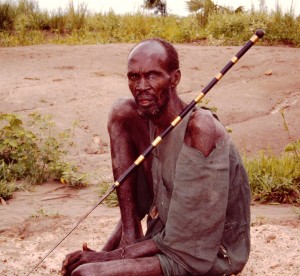
Days I got to do stuff felt more satisfying. One day we handed out pills for river blindness. This disease is caused by a parasite that lives in the water. It eats the retina and the victim goes blind. The disease is easily treated by pills that kill the parasite. We gave pills to thousands of people.
Another day I loaded syringes and gave injections. Before going to Tonj, a nurse had taught me how to do this, also teaching me the careful protocol to avoid accidental HIV infection from dirty needles. The reality of Tonj was nothing like the lessons. We had three people working an assembly line and hundreds lined up waiting for injections. One person would fill syringes while two partners would give injections and discard dirty syringes. Hands and arms crossed and crisscrossed, handing up loaded syringes, dirty syringes flying into the bucket. I almost got stuck a couple of times.
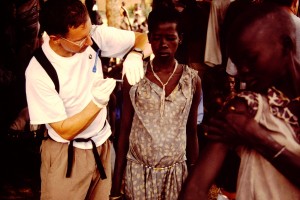
Giving injections was different from the lessons too. We were supposed to give the injects IM – that means intra-muscular. Many of the injectees had no muscle. We would pinch as much as we could before giving the injection, but sometimes it was just skin. Sometimes I could feel the needle hit bone. The adults didn’t complain, but the children always screamed. We learned how to inject the thigh of many kids because their arms were so skinny.
Each night, we showed the Jesus film, alternating between two versions, one dubbed in Arabic, the other in Dinka, from The Greatest Story Ever Told, produced by George Stevens in 1965. I remember several nights trying to carry the 16mm projector or gas generator down a dirt path to the field where we showed the film. Children would surround me and insist they be allowed to do the carrying.
It seemed the entire village came to watch the movies every night. I remember thinking while I watched, this must be the only film showing within a thousand of miles.
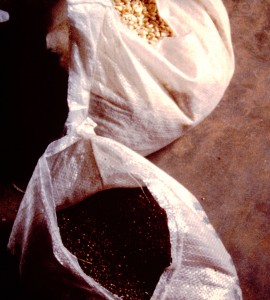
We brought three kinds of food. Bags of maize and sorghum, and a thin cereal to feed the children. The sorghum provided the greatest nourishment per pound. I think we needed to start malnourished adults on maize until their digestive systems were working. Our leaders explained that feeding the children anything stronger than thin cereal would make them sick.
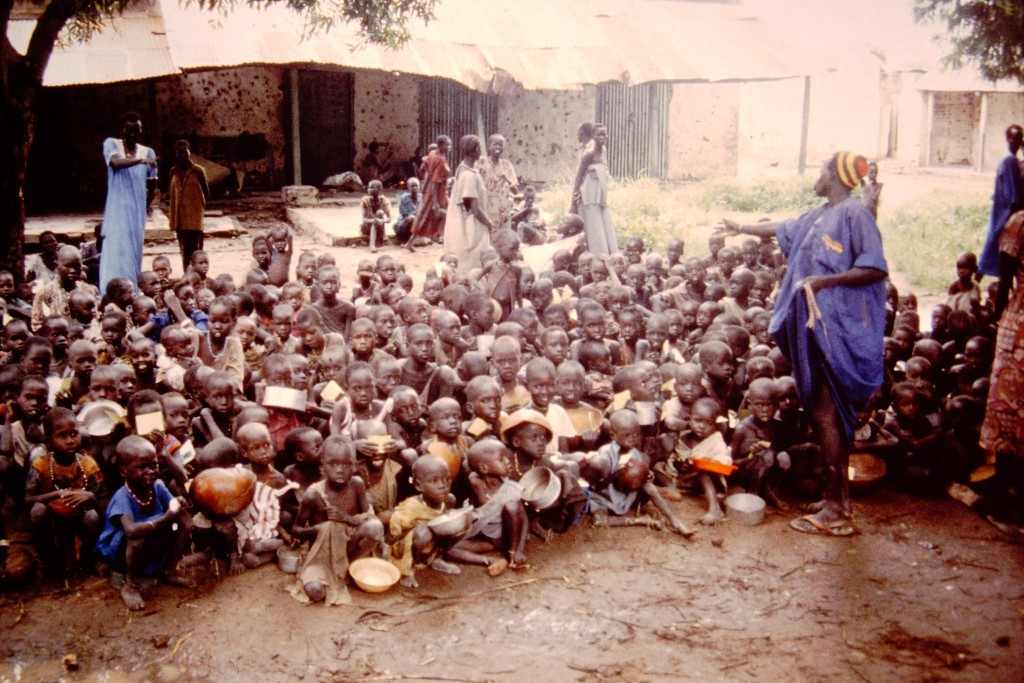
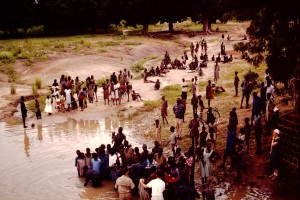
The pastors in our group performed baptisms in the river. Someone else kept count of the number of souls saved by these baptisms. I cannot remember the final tally, but it was in the hundreds.
All God’s Children
I’m writing this post in January, 2017, using notes I wrote many years ago. For years, as much as I longed to tell this story, I was stymied by thoughts of how shallow my puny effort could faithfully portray what was happening in Tonj. Today I finally decided to try to honor the people, most especially the children with my recollection. I can still remember, I still see now as I look into their eyes in these pictures, I see Jesus Christ.
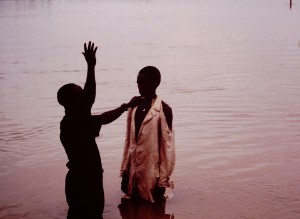
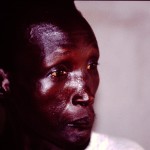
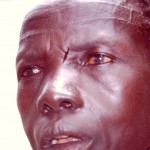
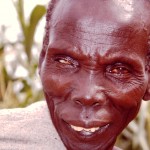
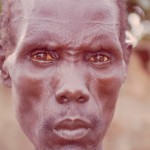
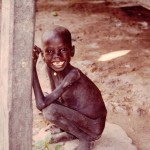
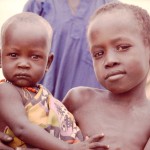
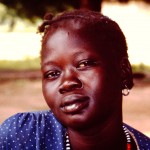
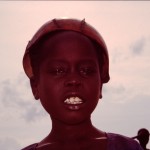
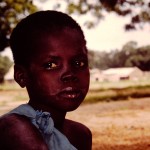
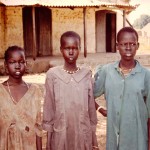
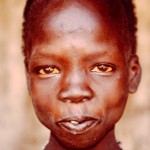
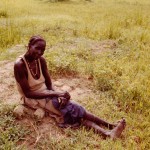
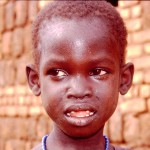
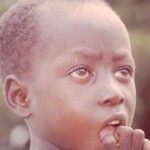

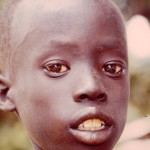
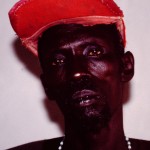
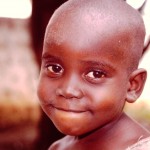
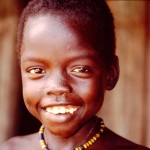
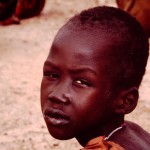
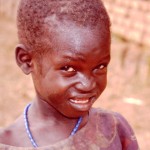
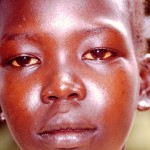
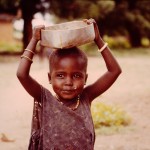
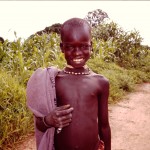
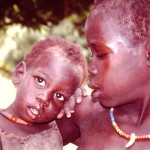
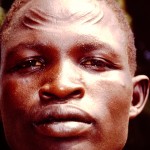
One thought on “Tonj”